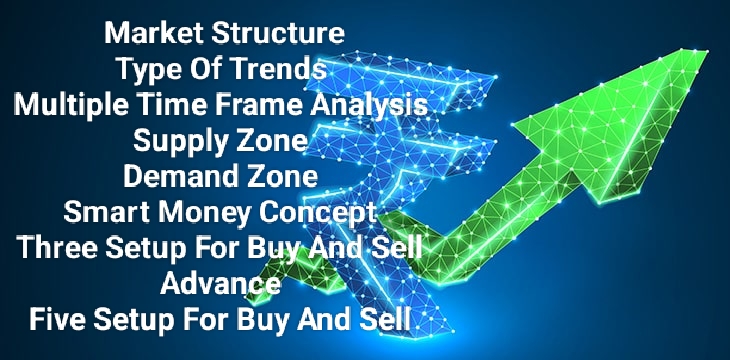
Welcome to the MG Trading Academy
At MG Trading Academy, we are committed to empowering individuals with the knowledge and skills needed to excel in financial markets.
Trading refers to the exchange of goods or services between two entities. In stock trading, the exchange occurs between investors or traders and companies issuing stocks. Trade takes place in organised stock markets with rules and regulations that all entities must adhere to. India also has regulatory bodies to supervise and maintain market integrity.
Regarding stock trading, trade refers to buying and selling listed companies' stocks in primary and secondary markets. Traders must choose one of the different types of trade strategies based on their orientation towards trading, financial goals, and duration for which they want to invest their money.


Technical Indicators ( RSI , Bollinger Bands , Pivot Point , Fibonacci etc. )

Candlestick, Chart Pattern, Support And Resistance, Type of Trend, Break Out, Reversal, Retest, Demand Zone, Supply Zone, Smart Money Concept, (RSI, Bollinger Band, Pivot Point, Fibonacci Volume) Buy Sell Super Setup With Logic. etc.
A Indian stock exchange is a marketplace where stocks, bonds, and other financial instruments are bought and sold. It enables companies to raise capital and investors to trade securities, promoting economic growth and liquidity. Major exchanges include NYSE, NASDAQ, and LSE. They ensure transparency, price discovery, and investment opportunities through regulations and indexes.
Feature and option trading involves buying and selling financial contracts whose value is based on an underlying asset, such as stocks, commodities, or currencies. Common types include futures, options, and swaps. Feature and option are used for hedging risk or speculating on price movements. They provide leverage, allowing traders to potentially gain or lose significantly.
The forex market, or foreign exchange market, is the largest financial market globally, where currencies are traded. It operates 24 hours a day, five days a week, facilitating international trade and investment. Forex trading involves pairs like EUR/USD or GBP/JPY and is driven by factors such as economic data, interest rates, and geopolitical events.
The crypto market is a digital marketplace where cryptocurrencies like Bitcoin, Ethereum, and others are traded. It operates 24/7, providing a decentralized platform for buying, selling, and investing in blockchain-based assets. The market is known for high volatility, driven by market sentiment, technological developments, and regulatory news, attracting both investors and speculators.
The crude oil market is a global trading platform where crude oil is bought and sold. It plays a crucial role in the energy sector, impacting economies and industries worldwide. Prices are influenced by supply and demand, geopolitical events, natural disasters, and economic indicators. Major benchmarks include Brent Crude and WTI.
The commodity market is where raw materials and primary products, such as gold, silver, oil, wheat, and other resources, are traded. It allows producers and consumers to hedge against price fluctuations and offers investors opportunities for diversification. Trading occurs through spot markets, futures contracts, and commodity exchanges like the CME and MCX.